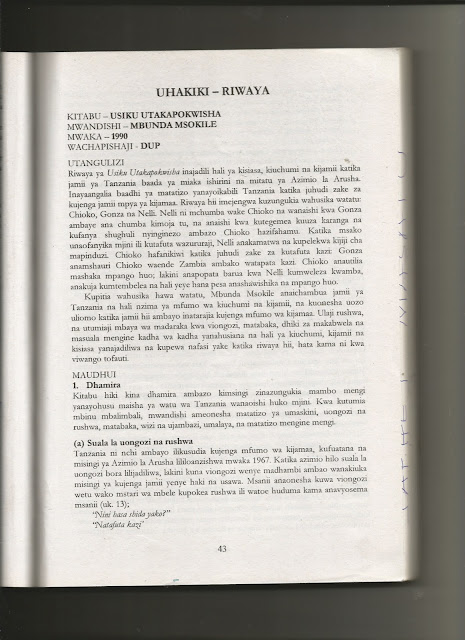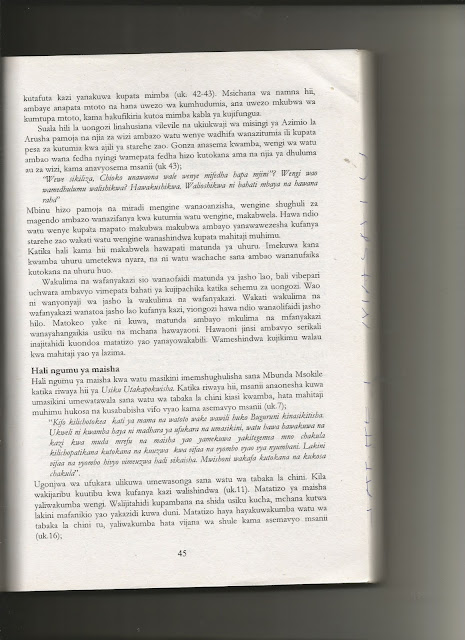AN ONLINE PLATFORM THAT PROVIDES EDUCATIONAL CONTENT,SYLLABUSES, STUDY NOTES/ MATERIALS ,PAST PAPERS, QUESTIONS & ANSWERS FOR THE STUDENTS,FORM I--VI ,RESITTERS,QT, ADULT LEARNERS, COLLEGE STUDENTS, PUPILS, TEACHERS, PARENTS,TEACHERS OF THE UNITED REPUBLIC OF TANZANIA AND WORLDWIDE.YOU ARE WELCOME TO SHARE YOUR KNOWLEDGE AND IDEAS.ENJOY MASATU BLOG.YOU CAN MAKE A DIFFERENCE.YOU CAN ACHIEVE EXCELLENCE. "LEARN.REVISE.DISCUSS".Anytime, Anywhere.
- HOME
- UTAKUZAJE UWEZO WAKO WA LUGHA ?
- MBINU ZA KUSOMA NA KUFAULU MITIHANI
- HOW TO IMPROVE YOUR MEMORY
- ONLINE LEARNING & DISTANCE LEARNING ( E--LEA...
- O-LEVEL & A--LEVEL SYLLABUS
- FORM FOUR ( F 4 )--SUBJECTS---TANZANIA
- FORM TWO ( F 2 )--SUBJECTS---TANZANIA
- FORM ONE ( F 1 )-- SUBJECTS---TANZANIA
- FORM FIVE( F 5 ) AND SIX ( F 6 )--SUBJECTS ---TANZANIA
- FORM THREE ( F 3 ) SUBJECTS----TANZANIA
- STANDARD 1 & 2 SUBJECTS / MASOMO YA DARASA 1 & 2-...
- STANDARD 3 & 4 SUBJECTS / MASOMO YA DARASA 3 & 4...
- STANDARD 5, 6 & 7 SUBJECTS / MASOMO YA DARASA...
Saturday, June 18, 2016
Thursday, June 16, 2016
Monday, June 13, 2016
Sunday, June 12, 2016
ASK WHAT YOU WILL DO FOR EDUCATION IN TANZANIA
I was recently reading an article on the website of a
Nigerian newspaper and was amazed by a recent news item in that country.
Apparently, the
minister of information, an Al-hajj said in part and I quote, “..the federal
government made cash recoveries totaling N78,325,354,631.82; US
$185,119,584.61; 3,508,355.46 pounds sterling and 11,250 euros from 29th May
2015 to 25th May 2016. I can tell you that this is just a tip of the
iceberg...” Recovered means the money was lost, right?
Maybe it
accidentally fell from government coffers to unknown accounts in foreign or
local banks and deposit boxes. And maybe Prezzo Buhari came to power and
created a lost and found deposit box so now whenever the current government
finds ‘lost money’ it automatically lands there.
Perhaps the 78.3
billion naira were recovered locally while the $185 million was found in
America and the 3.5 million pounds were lying somewhere in the now disunited
kingdom that is trying to exit the European Union.
This is big money
and if we are to believe the words of his Excellency Lai Mohammed, a lot more
public money is still lost and awaiting recovery. It just goes to show that the
bigger the national cake, the larger the slices that can magically disappear.
Imagine what
Tanzania’s Magufuli can do with such money in the education sector. He has
gained quite a following in Nigeria. And he can do quite a bit if we in
Tanzania manage to recover lost monies in Swiss, British, American or other
currency. Currently we are caught up in the government budget season, with all
kinds of people weighing in regarding what the government should fund in education.
As if the
government of the day is Santa Claus and Christmas came early. We are also in
the month of Ramadan. Let us take to our hearts some spiritual lessons of the
month such as being frugal, helping the ones in need and fostering the spirit
of togetherness and brotherhood. Is this not the spirit that compels fasting
folks to invite people of other faiths to share in the iftar? Some wealthier
folks also organise and finance evening breakfast for those less endowed.
When I lived in
Pakistan, I was invited to quite a few iftar gatherings. I must have added a
few pounds of fat during the Ramadan over the years. Alas, my Tanzanian Muslim
friends have not been as readily welcoming as my Pakistani hosts of yester
years. Back to education.
Prophet Mohammad, PBUH,
put a lot of emphasis on the importance of education, urging his daughters to
seek knowledge even if that meant going to China for it. I believe any good
moumeen would do whatever it takes to ensure his children receive the best
education they can.
Perhaps in this
holy month, clerics can urge their flock especially in peripheral provinces
such as Mtwara, Lindi and Kigoma to ensure their children both male and female,
go to school.
No government can
drag your children to school even an overzealous provincial commissioner was to
personally whip parents of truant kids or the police regularly arrest guardians
of children sent to herd cattle and lamb. Is sending kids to school enough?
Absolutely not.
There is a lot individuals and communities can do. When I was in junior primary
school, the government abolished middle schools and expanded lower primary
schools to accommodate more pupils and higher classes.
Did the Wachagga
wait for government to build new classrooms? Not really. Even us pupils
participated in collecting building materials such as sand and gravel from
river Karanga for making bricks.
The wananchi
provided the labour and materials like timber and cement. Now that education is
free again, a few hundred thousand children who had previously been hidden from
view, have shown up at school premises.
Existing
structures cannot accommodate. It is time for whole villages to chip in. Those
villages being served by a particular school must be mobilised to build more
classrooms and toilet facilities.
As citizens we
should not be waiting for government to do everything. We are part of
governance. We have a wealth of retired civil servants with excellent
knowledge, skills and patience to teach, especially in secondary and tertiary
schools. When will the minister of education think outside the box of
recruiting teachers from training colleges and education faculties?
I know I can teach
and I am certain there are a few thousand Tanzanians like me who can lend their
skills for the good of present and future generations of Watanzania.
Please create a
formal mechanism that will allow district authorities and school leaders to
recruit retired persons from near their schools. Recruiting temp teachers from
neighbourhoods means the transport and accommodation issues will not be an
issue for them.
This is something
us citizens can do for education in Tanzania. Another teacher solution is to
invite teachers from Kenya, Uganda, Malawi or even Zimbabwe to come and teach
in Tanzania at local salaries. We are in the 21st century where goods and
services are exchanged easily across borders.
If we keep crash
training of more teachers to cover existing teacher shortages, we will end up
with many who do not like teaching but are doing it as duty. We can train
people to become teachers, but we cannot make them good teachers by more
training.
The best teachers
enjoy their work, they love teaching. Any of us can remember such teachers in
each of our schools. Parents would know if their son or daughter loves teaching
and/or has the ability to teach others.
If we love our
Tanzania, we should encourage our bright kids to become teachers. Teaching is a
noble and well respected profession. At least it used to be, not because
teachers were highly paid, but because teachers moulded society by producing
engineers, medics, soldiers and all other professionals.
It is time for
every Tanzanian to invest in education. Our time, our money, our timber and
bricks and our sons and daughters. God bless Tanzania.
NACTE EASES REGISTRATION OF STUDENTS ONLINE
PARENTS who intend
to send their children to technical colleges have been advised to use the
online system which was launched recently by the National Council for Technical
Education (Nacte) to avoid joining bogus colleges.
“Students pursuing
first degrees, diplomas and certificates in any recognized middle level
colleges in the country will from now on be enrolled via the launched Central
Admission System (CAS),” said Nacte acting Executive Secretary, Dr Adolf
Rutayunga when launching the online registration system.
The online system
showed fruitful results after years of being tested, and the authorities look
forward to addressing the challenges that afflict students during the admission
period.
“The new system
will curb the use of forged certificates, whereby you will be required to fill
your Advance Level (A-Level) or Ordinary Level (O-Level) index numbers, which
will give no chance to those who failed,” he said.
It is also meant
to put in check anyone using fake certificates as the system is connected
directly to the Ministry of Education, Science, Technology and Vocational
Training to detect and recognize the index numbers.
However, this will
ensure the Council achieves its core function of making sure the technical
colleges produce qualified products at the end of the training. The NACTE
online system is expected to waive the costs that applicants were incurring
during admission time.
The cost effective
system will help applicants to save 10,000/- to 15,000/- they were spending on
buying application forms at various colleges, and the application process time
will be reduced.
Even more
important to note is that double admission will have no chance in this system
and more students are expected to have the opportunity to achieve their dreams.
According to Nacte during the conventional system or filling forms days, one
applicant
could have been
selected in more than two colleges, hence distort the admission opportunities
which deprived some potential candidates from gaining admission. Most
important, perhaps, students will be assured of enrolling only in accredited
institutions.
Given that there
are a number of unregistered technical colleges which do not meet standards and
therefore provides mediocre education. The consequences are based on producing
tutorial assistants who are incompetent, due to the poor learning environment
that these graduates have gone through including lack of teaching aids.
Therefore under
the new order only those recognized technical colleges which meet the standards
will be in the list of school choices so as to save parents and students from
travelling from one college to another searching for better and quality education.
This occurs when
such substandard colleges are banned or shutdown which brings a lot of
inconvenience to the parents in terms of finances and time.
Regarding further
benefits of using the system, the acting executive secretary, said it will also
help the government to have accurate data on students securing admission to
different institutions and identify with ease those who are qualified.
Manpower in any
industrialised country is as important as the capital itself, therefore, if we
have plan of being industrialized country we need to produce more technicians
and engineers to run the industries machines and through CAS it is easy for the
government to know number of technicians to help in its development plans.
The enrollment
through the newly introduced electronic system will start effective 2016/2017
academic year. “We would like to announce that, application for certificate and
diploma programmes by using CAS will officially start through our website
www.nacte. go.tz,” he said the Nacte boss.
In another effect,
the system will be used in applying and coordinating training programmes for
all institutions registered with Nacte. The new system was developed last year
and was first used to streamline the admission of students to different
colleges for certificate and diploma programmes in health and education
colleges.
“The council has
been working in collaboration with the Tanzania Commission for Universities
(TCU) in coordinating the admission of students to different universities for
first degree programmes through the system,” he said.
The launch of the
system means that all applications by students must be channelled through CASAs
regulator the Council has established a framework that sets the quality
standards for all technical education and training institutions.
The framework
guides registration and accreditation of institutions and upholds standards in
provision of technical education. According to Nacte, currently there are 514
colleges countrywide offering technical education under its supervision.
Subscribe to:
Posts (Atom)

















































